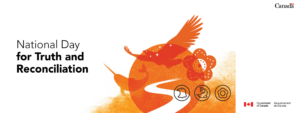September 29, 2023 | Read Time: 3 Min. | 2023

Did you know?
- What specific initiatives or actions can immigrant youth-based organizations take to promote Truth and Reconciliation beyond simply observing the day?
- A practical commitment to truth and reconciliation comes from learning, understanding, and recognizing the experiences indigenous populations across Canada went through in the history of nation building in our country. As a youth-focused and school-based service provider supporting the settlement and integration of newcomer students, we can accomplish this through educational information sessions and group engagement activities that can be delivered in school premises and in the community.
- How can we ensure that our staff members are well-informed and culturally sensitive when addressing Indigenous issues within our organization?
- CBFY has already taken some meaningful steps and continues to practice the same in ensuring that our staff are well informed of indigenous issues. Among these steps are sharing indigenous focused reading materials and encouraging staff to participate in training sessions that can build their knowledge and understanding in this area. Last year, reading materials on the 12 modules of the Indigenous Canada course offered by University of Alberta was shared with staff. Topics included Indigenous World View, The Fur Trade, Treaties, New Rules New Game, Killing the Indian in the Child (Indian Schools), Indigenous Women, Girls, and Gendered People, Sovereign Lands, the Red Power Movement, Modern Indian, The Indian in the City, and Current Social Movements.
- What are some tangible examples of incorporating Indigenous teachings and perspectives into our organization’s day-to-day programs?
- CBFY has already incorporated Indigenous teachings and perspectives into certain areas of our programing and will continue doing so expanding into more areas of service delivery. Currently our newcomer mentorship and afterschool program activities are guided by the very popular Indian engagement philosophy called Circle of Courage, which focuses on four important areas of development: Generosity (character built by having a concern for others and acting to make a difference), Belonging (human bonds built by relationships of trust, loving others, and sense of community), Mastery (learning and achieving competence), and Independence (setting one’s own goals, making decisions, disciplining oneself, and taking responsibility for one’s own actions or omissions).
- What steps can we take to ensure that our programs authentically reflect Indigenous perspectives and values while respecting cultural sensitivity?
- With a view to reflecting Indigenous perspectives and values in our programing, in addition to aligning the content of our youth engagement activities with the Indigenous philosophy of Circle of Courage, we have started inviting Indigenous elders and educators not only to our organization-wide meetings and events, but also to information sessions/workshops delivered to newcomer youth in schools and community venues to share their history, world view, beliefs, cultural and ethical values through storytelling, the narration of personal life journeys, etc. We will continue doing more of this and make the incorporation of Indigenous history, culture, and value perspectives part of our program planning in close collaboration with indigenous elders and institutions.
Author: Shimeles Kebede, Program Manager – Operations




